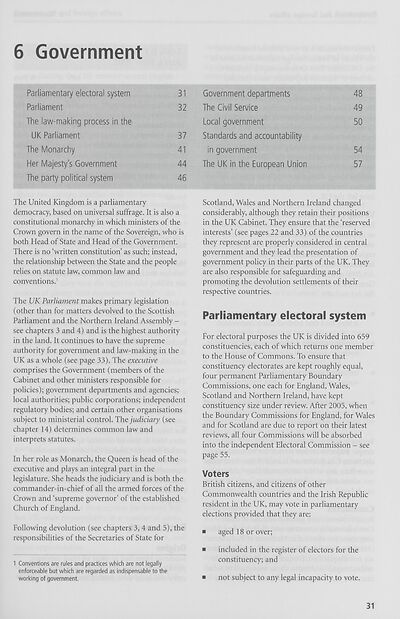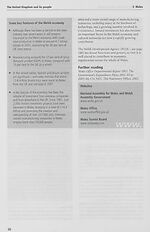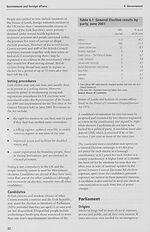Download files
Complete book:
Individual page:
Thumbnail gallery: Grid view | List view

6 Government
Parliamentary electoral system 31
Parliament 32
The law-making process in the
UK Parliament 37
The Monarchy 41
Her Majesty's Government 44
The party political system 46
Government departments 48
The Civil Service 49
Local government 50
Standards and accountability
in government 54
The UK in the European Union 57
The United Kingdom is a parliamentary
democracy, based on universal suffrage. It is also a
constitutional monarchy in which ministers of the
Crown govern in the name of the Sovereign, who is
both Head of State and Head of the Government.
There is no ‘written constitution’ as such; instead,
the relationship between the State and the people
relies on statute law, common law and
conventions.1
The UK Parliament makes primary legislation
(other than for matters devolved to the Scottish
Parliament and the Northern Ireland Assembly -
see chapters 3 and 4) and is the highest authority
in the land. It continues to have the supreme
authority for government and law-making in the
UK as a whole (see page 33). The executive
comprises the Government (members of the
Cabinet and other ministers responsible for
policies); government departments and agencies;
local authorities; public corporations; independent
regulatory bodies; and certain other organisations
subject to ministerial control. The judiciary (see
chapter 14) determines common law and
interprets statutes.
In her role as Monarch, the Queen is head of the
executive and plays an integral part in the
legislature. She heads the judiciary and is both the
commander-in-chief of all the armed forces of the
Crown and ‘supreme governor’ of the established
Church of England.
Following devolution (see chapters 3, 4 and 5), the
responsibilities of the Secretaries of State for
1 Conventions are rules and practices which are not legally
enforceable but which are regarded as indispensable to the
working of government.
Scotland, Wales and Northern Ireland changed
considerably, although they retain their positions
in the UK Cabinet. They ensure that the ‘reserved
interests’ (see pages 22 and 33) of the countries
they represent are properly considered in central
government and they lead the presentation of
government policy in their parts of the UK. They
are also responsible for safeguarding and
promoting the devolution settlements of their
respective countries.
Parliamentary electoral system
For electoral purposes the UK is divided into 659
constituencies, each of which returns one member
to the House of Commons. To ensure that
constituency electorates are kept roughly equal,
four permanent Parliamentary Boundary
Commissions, one each for England, Wales,
Scotland and Northern Ireland, have kept
constituency size under review. After 2005, when
the Boundary Commissions for England, for Wales
and for Scotland are due to report on their latest
reviews, all four Commissions will be absorbed
into the independent Electoral Commission - see
page 55.
Voters
British citizens, and citizens of other
Commonwealth countries and the Irish Republic
resident in the UK, may vote in parliamentary
elections provided that they are:
■ aged 18 or over;
■ included in the register of electors for the
constituency; and
■ not subject to any legal incapacity to vote.
31
Parliamentary electoral system 31
Parliament 32
The law-making process in the
UK Parliament 37
The Monarchy 41
Her Majesty's Government 44
The party political system 46
Government departments 48
The Civil Service 49
Local government 50
Standards and accountability
in government 54
The UK in the European Union 57
The United Kingdom is a parliamentary
democracy, based on universal suffrage. It is also a
constitutional monarchy in which ministers of the
Crown govern in the name of the Sovereign, who is
both Head of State and Head of the Government.
There is no ‘written constitution’ as such; instead,
the relationship between the State and the people
relies on statute law, common law and
conventions.1
The UK Parliament makes primary legislation
(other than for matters devolved to the Scottish
Parliament and the Northern Ireland Assembly -
see chapters 3 and 4) and is the highest authority
in the land. It continues to have the supreme
authority for government and law-making in the
UK as a whole (see page 33). The executive
comprises the Government (members of the
Cabinet and other ministers responsible for
policies); government departments and agencies;
local authorities; public corporations; independent
regulatory bodies; and certain other organisations
subject to ministerial control. The judiciary (see
chapter 14) determines common law and
interprets statutes.
In her role as Monarch, the Queen is head of the
executive and plays an integral part in the
legislature. She heads the judiciary and is both the
commander-in-chief of all the armed forces of the
Crown and ‘supreme governor’ of the established
Church of England.
Following devolution (see chapters 3, 4 and 5), the
responsibilities of the Secretaries of State for
1 Conventions are rules and practices which are not legally
enforceable but which are regarded as indispensable to the
working of government.
Scotland, Wales and Northern Ireland changed
considerably, although they retain their positions
in the UK Cabinet. They ensure that the ‘reserved
interests’ (see pages 22 and 33) of the countries
they represent are properly considered in central
government and they lead the presentation of
government policy in their parts of the UK. They
are also responsible for safeguarding and
promoting the devolution settlements of their
respective countries.
Parliamentary electoral system
For electoral purposes the UK is divided into 659
constituencies, each of which returns one member
to the House of Commons. To ensure that
constituency electorates are kept roughly equal,
four permanent Parliamentary Boundary
Commissions, one each for England, Wales,
Scotland and Northern Ireland, have kept
constituency size under review. After 2005, when
the Boundary Commissions for England, for Wales
and for Scotland are due to report on their latest
reviews, all four Commissions will be absorbed
into the independent Electoral Commission - see
page 55.
Voters
British citizens, and citizens of other
Commonwealth countries and the Irish Republic
resident in the UK, may vote in parliamentary
elections provided that they are:
■ aged 18 or over;
■ included in the register of electors for the
constituency; and
■ not subject to any legal incapacity to vote.
31
Set display mode to:
![]() Universal Viewer |
Universal Viewer | ![]() Mirador |
Large image | Transcription
Mirador |
Large image | Transcription
The item on this page appears courtesy of Office for National Statistics and may be re-used under the Open Government Licence for Public Sector Information.
| Britain and UK handbooks > UK: The official yearbook of the United Kingdom of Great Britain and Northern Ireland > 2003 > (45) |
|---|
| Permanent URL | https://digital.nls.uk/204923692 |
|---|
| Attribution and copyright: |
|
|---|---|
| Description | Three volumes of 'UK: The official yearbook of the United Kingdom of Great Britain and Northern Ireland', published annually by the Office of National Statistics from 2002-2005. |
|---|---|
| Shelfmark | GII.11 SER |
| Description | Three titles produced by the British Government from 1954-2005 describing 'how Britain worked'. They are: 'Britain: An official handbook' (1954-1998), 'Britain: The official yearbook of the United Kingdom' (1999-2001), and 'UK: The official yearbook of the United Kingdom of Great Britain and Northern Ireland' (2002-2005). These 50 reports provide an overview of Britain's economic, social and cultural affairs, its environment, international relations, and the systems of government. They give an impartial summary of government policies and initiatives, and explain how public services are organised. |
|---|---|
| Additional NLS resources: |
|

